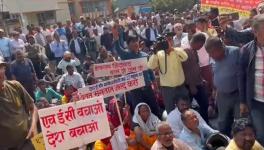Jharkhand Activists say Advasis Framed Under UAPA During Anti-Maoist Drive, Plan 'Jan Sunwai'
File Photo.Image Credit--RoadScholarz Twitter.
Kolkata: Not all those reaching the court at Tenughat in Jharkhand's Bokaro district to register their attendance at the hearing of their cases are remotely associated with extremist groups. However, they have to abide by the court fiat month after month, and at times, year after year, because the Jharkhand police have found 'evidence' of their connection with Maoists and treated the same as a "cognisible offence". The rest followed.
In a sense, such people are the fortunate ones as they are on bail. There are the ill-fated ones who continue to languish in jails, often not knowing what the charges are against them. They have been "framed" by the Jharkhand police in their drive against Maoists and suspected extremists on the basis of "information gathered by their informers", say activists. Coming in handy for the police is the Unlawful Activities (Prevention) Act of 1967, which has undergone several amendments; each time, its provisions have been made sterner and stiffer, especially since the Bharatiya Janata Party-led NDA government came to power in 2014.
People actively involved with the Jharkhand Janadhikar Mahasabha (JJM), a coalition of progressive civil rights outfits, lament that the Hemant Soren-led government of the Jharkhand Mukti Morcha-Congress alliance is yet to do anything worthwhile. This is even though the alliance partners in their respective manifestos had pledged to try and mitigate the misery of the victims who were allegedly framed during the term of the previous BJP-led ministry with Raghubar Das as Chief Minister. Official figures showed that UAPA cases during 2015-19 rose by 138%.
Between August 2021 and January 2022, JJM's member units surveyed 31 "innocent" adivasi-moolvasi persons in Gomia and Namadih blocks of Bokaro district. They were accused of being Maoists and charged under the UAPA. The units that conducted the survey were, among others, Adivasi-Moolvasi Adhikar Manch of Bokaro and Adivasi Women's Network at Bagaicha in Namkum area of Ranchi. The aim of the survey, made public on July 6, was reportedly to understand the police tactics of wrongly accusing a person and incarcerating him/her, the situation the accused are facing and the suffering their family members are facing. The report was dedicated to Stan Swamy, who tirelessly fought for undertrials' rights [July 5 was his death anniversary].
The survey report gives the case history of the 31 surveyed victims; all have been accused of either being Maoists, or cooperating with them, or being involved in violent incidents attributable to Maoists. Invariably, different sections of the UAPA and the Indian Penal Code, including Section 17 of Criminal Law (Amendment) Act of 1908, have been invoked against them. The police have also used the Explosives Act in some cases.
Those persecuted and their family members have no idea about the Acts used against them. They do not even have any document – copies of FIRs, case diaries etc. – with them; these are with lawyers, the report said.
The police moved against them despite the victims' repeated denials of them being either Maoists or sympathisers of Maoists or having taken part in acts of violence committed by Maoists. Most of the victims are from forested villages. Earlier, Maoists used to visit those villages and it is a fact that sometimes they had to be given food by the villagers. This was more on humanitarian considerations, but even such gestures have been held against the villagers by the police. In recent years, visits by extremists to forested villages have declined.
According to the JJM's findings, cases against 16 persons were registered before 2014. Of the 31 surveyed persons, cases against nine were registered between 2014 and 2019, and three post-2019.
From their response, it is seen that they spent an average of two years in jail. Some victims have had to spend over five years in jail. In recent years, they have been getting acquitted one by one. Out of 29 accused, nine have been acquitted in all cases against them. Twenty of them are still to be cleared of one case each.
The following four instances picked up from the survey list of 31 persons illustrate how the system is working in Jharkhand:
Birsa Majhi: Aged 43, unlettered, resident of Chorpania village under Tilaiya panchayat, son of Rameswar Majhi, economically very backward.
The wage Birsa and his son get from a brick kiln is the main source of their livelihood. He has been facing a trial under Prevention of Witch (Daain) Practice Act for quite some time. All of a sudden, in last December, he was summoned by the local Jogeswar Bihar PS and told to surrender for his alleged Naxal links.
Inquiries by surveyors suggested the police were looking for a person with the same name but whose father was one Budhu Majhi. The police did not accept the targeted person's repeated denial of his Naxal links. He also argued that he had never been told of his being the one with a bounty of Rs 1 lakh (in local usage, he is an Inami Naxal). Moreover, his father's name is Rameswar Majhi. The police rejected his plea and forced him to surrender. Perhaps, the police could not trace Birsa, the absconder. The new FIR did not mention Budhu Majhi's name, which lent credence to the surveyors' suspicion.
Hiralal Tudu: Aged 26, resident of village Tutijharna under Tilaiya panchayat, studied up to intermediate level and received training in operating computer, son of Dhaniram Tudu, relatively better off economically.
Hiralal was arrested on September 3, 2014, on the charge of hiding guns of Maoists in boxes. In the course of 2017, he got bail at a higher court.
Sarodevi: Resident of Patratand village under Pachmo panchayat, studied up to secondary level, husband Niranjan Mahto; sustenance from farming on a small patch of land and meagre earnings of her two sons.
She was accused of helping extremists with the supply of explosives and involvement in the Naxals' alleged design to kill police personnel; same charges were levelled against her husband Niranjan, who was beaten by Tenughat police. The police allegedly forced him to put his signature on six blank pages.
Surajmuni Kumari: Resident of Tutijharna village under Tilaiya panchayat, studied up to class IX.
Surajmuni was charged with moving in the company of Maoists and taking care of their guns. Following blasts reportedly engineered by extremists in the Lalpania area between February and March 2014, Surajmuni was arrested. At that time, her mother was with her, but she was left at the CRPF camp and allegedly maltreated. At the time of arrest, Surajmuni was aged about 16 years.
The survey was conducted on behalf of the JJM by Alka Aind, Dinesh Murmu, Elina Horo, Hiralal Tudu (one of the accused persons mentioned above), P M Tony, and Siraj Dutta. NewsClick contacted them for clarifications and their plans for follow-up action.
When asked how the adivasis met legal expenses to secure justice, Dutta, a Ranchi-based social policy analyst, told NewsClick that families were forced to sell their livestock or mortgage a portion of their land. Some families arrange loans from their relatives and other villagers, and in the process, their misery accentuates, he said, adding that sometimes, their children drop out of school.
Information obtained from 28 respondents placed the average litigation expenses at Rs 90,000. Those fighting multiple cases often end up spending up to Rs 3 lakh. The main sources of livelihood for them are small-scale farming, and whatever some family members earn as casual labour, Dutta told NewsClick.
JJM said it has plans for bringing the findings into the public domain by holding 'jan sunwai' (public hearing) as part of its objective to create awareness among the public about how adivasi-moolvasis suffer because the police purportedly implicate them in false cases in anti-Maoist drive. Government officials, including senior police personnel, will be persuaded to be present at the proposed 'jan sunwai' programmes, Alka told NewsClick. "We are trying to involve more socially active people," she added.
According to Elina Horo, the Birsa Majhi episode lays bare how the police, in their quest to book Maoists and identify suspected extremists, harass innocent adivasis who have no knowledge of the laws applied against them. "The cases compiled in our report are all from the Bokaro district. Jharkhand has two dozen districts and similar cases of harassment are aplenty. We have to work on them. We want a senior police officer assigned to prevent human rights violations. Let us see when the government responds," Elina told NewsClick.
Giridih, Hazaribagh, Chaibasa and Khunti are other areas in Jharkhand "where we understand there are plenty of examples of harassment of backward, economically weak community people by the police on anti-Maoist duty," according to P M Tony. Also, there are instances of names being included in the FIRs on the basis of suspicion, he claimed. Inordinate delays in the filing of chargesheet are common and abnormal delays mark the commencement of court trials, Tony told NewsClick.
"The versions recorded in FIRs, copies of which we managed to procure and that given to us by victims, differ in many cases. Also, as a result of their financial constraints, they cannot arrange competent legal assistance. Cases drag on, and they remain undertrials. By the time their innocence is established and they are acquitted, they have lost precious times of their life. Indiscriminate application of UAPA is a major factor in this persecution," Dinesh Murmu said. "We want the repeal of UAPA; it's harmful to the last letter of the Act," he added.
The same demand was made by Tudu whose plans for starting a computer training centre and living a dignified life were disrupted by the "irresponsible action of the police, who did not realise how their recourse to falsehood can ruin a person's life." He told NewsClick, "UAPA's continuation, I am sure, will ruin more careers. The police are committing serious crimes in their anti-Maoist operations. UAPA has to go."
Dutta has demanded a judicial inquiry into the role of the Jharkhand police. "It's absurd to frame a poor adivasis under UAPA just because he or she offered food to a Maoist," he said.
Get the latest reports & analysis with people's perspective on Protests, movements & deep analytical videos, discussions of the current affairs in your Telegram app. Subscribe to NewsClick's Telegram channel & get Real-Time updates on stories, as they get published on our website.
























